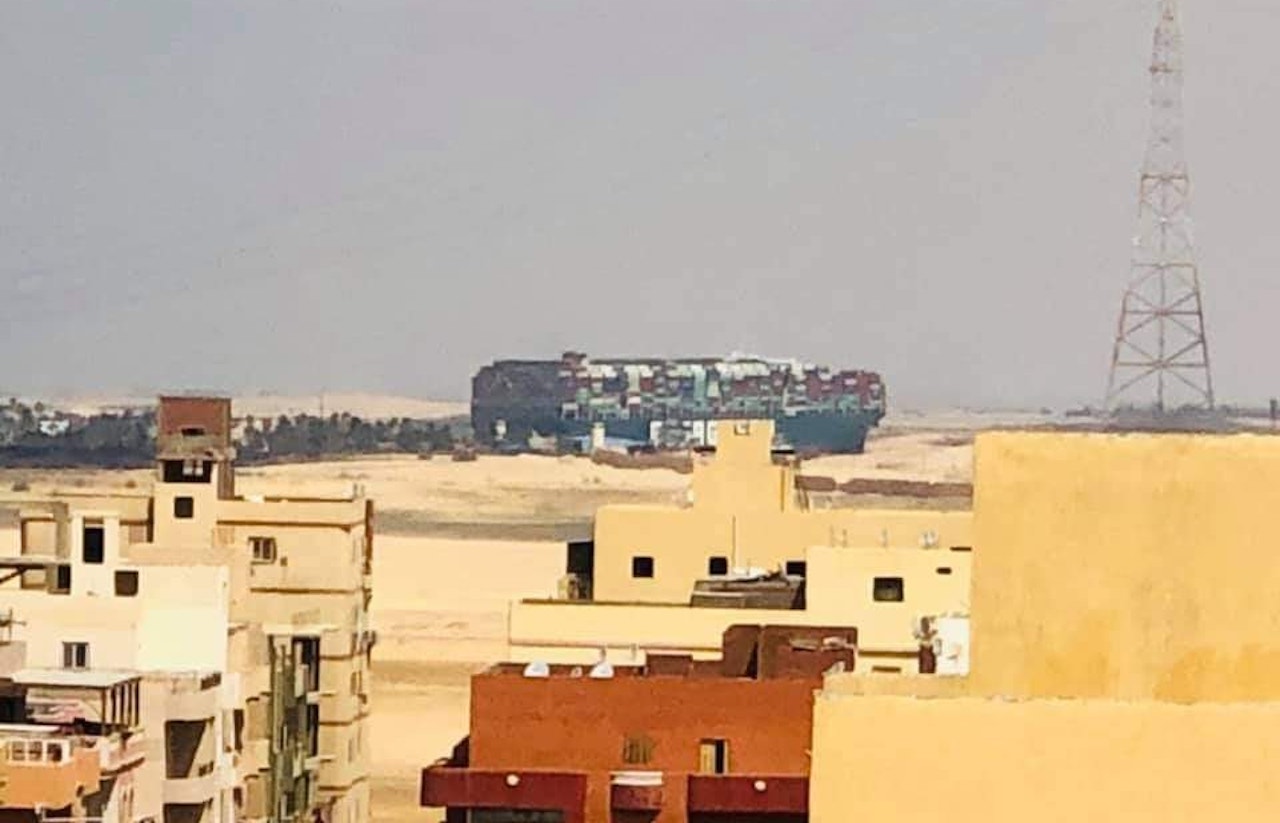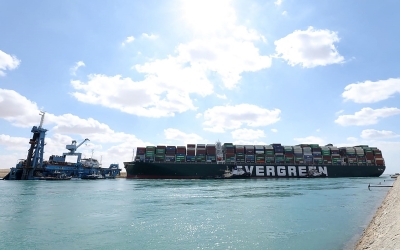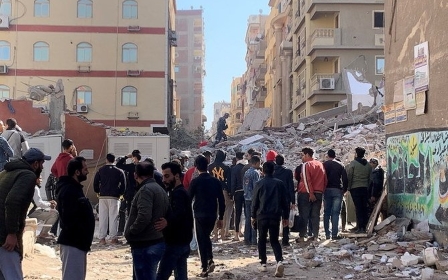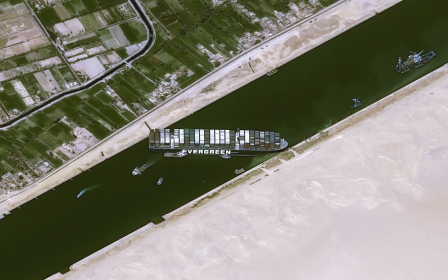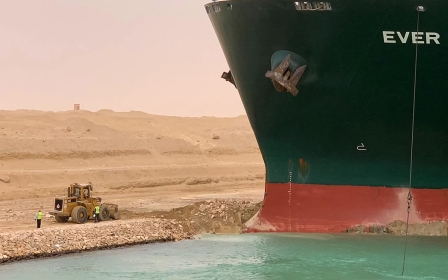Suez Canal: Egyptians in neglected village thrust into limelight by ship crisis
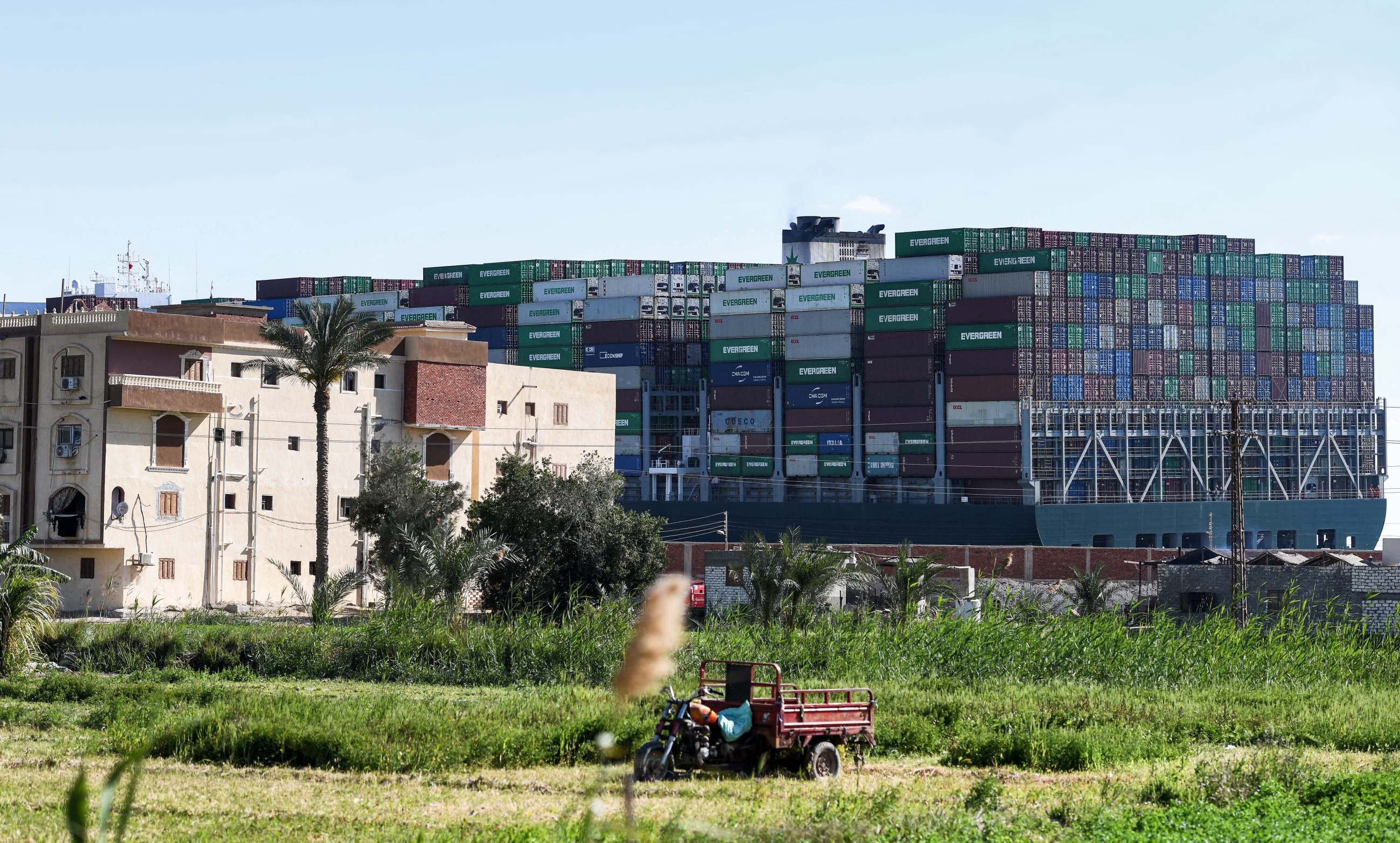
Seats were spread out in a cafe in the village of Manshiyet al-Rugola, as customers prepared to watch Egypt and Kenya go head-to-head in the latter’s Moi Stadium for a 2022 African Cup of Nations qualifiers match.
"What’s up with [Mohamed] Salah? He is like this ship, stuck at the pitch in the final third," said one customer 65 minutes in, gesturing east after Kenya drew level.
Awad, a 31-year-old salesperson in a fish factory, was pointing towards the Suez Canal, where the 400-metre-long container ship Ever Given has been lodged since last Tuesday, suspending traffic on one of the world's busiest trade routes.
'We hope that some of the effort that is given to getting the ship on track is exerted to solve the problems of the village'
- Awad, villager
He grew up and still lives in the adjacent village of Manshiyet al-Rugola, where he and other residents have for decades watched large ships passing through without incident, carrying oil, gas and other precious cargo between Asia and Europe.
The massive amount of time and money the government and international actors have put into refloating the ship, which was partially achieved on Monday morning, has been noted with a bitter irony by some in the impoverished village.
New MEE newsletter: Jerusalem Dispatch
Sign up to get the latest insights and analysis on Israel-Palestine, alongside Turkey Unpacked and other MEE newsletters
“We hope that some of the effort that is given to getting the ship on track is exerted to solve the problems of the village," said Awad.
International attention
Manshiyet al-Rugola has gained global fame over the last week, possibly the first time it would have had its name written in English in the international press.
Residents arguably have the best seat in the house for overlooking the stuck container ship that has held the world’s trade on edge.
But the village, which is located 20 minutes by car from the Arbain Square - one of the starting points of the 2011 uprisings that saw dozens of protesters killed in clashes with the police - otherwise resembles many underdeveloped villages scattered across the country.
Taxi drivers refuse to enter the village due its bumpy roads, leaving tuk-tuks, private cars and horse carts as the only options, while sewage is a visible problem.
Several residential houses in red bricks, other in flashy yellow paint, built next to agricultural lands are illegal and operating with stolen electricity and water meters.
Tamer, a 16-year-old schoolboy from Manshiyet al-Rugola, had never seen foreigners in his life until the Ever Given, one of the largest ships on earth, became wedged across the canal, blocking hundreds of other vessels and disrupting global supply chains.
“I have seen a lot of them in the last few days. A lot of pretty women among them too,” he told MEE while driving a tuk-tuk in the unpaved roads of Suez, picking up some cash to support his family while out of school.
He has seen them waving from the top of the massive ships going up and down the historic canal.
The Ever Given not only made Manshiyet al-Rugola famous overnight, but it has also brought a lot of plain-clothed policemen into the underdeveloped village.
“The city has not seen so much security presence and plain-clothes policemen since the last elections," said Samia, a 45-year-old housewife.
Her son Hyaithm, 29, jokes as a police car passes near his house: “We are sure of our president and the military that they will solve this problem and will punish the bad [Muslim] Brotherhood for their role in the accident," referring to President Abdel Fattah el-Sisi's long-running obsession with cracking down on the outlawed Islamist group.
In addition to the flood of memes that erupted after the ship crisis, Egyptians have been joking that the government will accuse the ship and its captain of being part of a conspiracy to damage the reputation of Egypt.
Samia said she thought the ship was a “heavy guest”, an Egyptian idiom meaning an unwanted visitor.
“We are used to seeing all kinds and sizes. We woke up Tuesday and found it landing and not wanting to leave,” Samia said.
Emigration hopes
While much of the world has been gripped by the canal crisis and its impact on global trade, less attention has been paid to the direct effect it could have on the Egyptian economy, which relies on the canal for billions of dollars worth of revenue.
Samia said she was fearful of a potential knock-on effect on the economy, but noted that so far she hadn't seen any change in her living standards.
“We keep hearing in the news that this is a big problem and the dollar price might be affected,” she said, adding: “Let’s hope our friend [the Egyptian pound] remains the same”.
For Tamer, who in his life has only travelled to Alexandria and the affluent north coast - where he worked as a ticket collector - the passage of ships in the canal symbolises his hope that he will one day get out of Manshiyet al-Rugola.
He has long seen ships carrying products he has not heard of coming and going from all over the globe, and one day hopes he might do the same, adding that a lot of his friends were also thinking of emigrating, even illegally by forged papers or taking boats to Italy.
“I heard this ship was going to Holland. I wish I could live there and only visit Manshiyet al-Rugola on vacations."
*Names were changed for safety reason
This article is available in French on Middle East Eye French edition.
Middle East Eye delivers independent and unrivalled coverage and analysis of the Middle East, North Africa and beyond. To learn more about republishing this content and the associated fees, please fill out this form. More about MEE can be found here.


